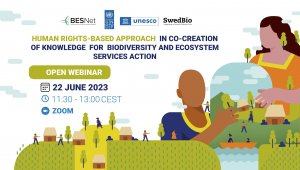
What is the human-rights-based approach (HRBA)?
Together with gender equality and leaving no one behind imperative, the human-rights-based approach (HRBA) underpins the 2030 Agenda for Sustainable Development and the historic Kunming-Montreal Global Biodiversity Framework (GBF). Recognizing human rights as universal values represents a paradigm shift, emphasizing that every step towards achieving Sustainable Development Goals (SDGs) and biodiversity conservation pivots on non-discrimination, equality, and inclusivity.
HRBA is conceived as a “conceptual framework for the process of human development that is normatively based on international human rights standards and operationally directed to promoting and protecting human rights1’’. HRBA recognizes that inequalities are at the heart of development challenges and that dismantling discriminatory practices and unjust distributions of power is key to achieving a world where people live in harmony with the planet2. The application of HRBA strives to strengthen the capacity of ‘duty-bearers’ (both state and non-state actors) to meet their obligations of respecting, promoting, and protecting human rights and that of ‘rights-holders’ to claim their rights.
BES-Net’s commitment to HRBA
Operating as a consortium of the United Nations Development Programme (UNDP), the UN Environment Programme World Conservation Monitoring Centre (UNEP-WCMC), and the UN Educational, Scientific and Cultural Organization (UNESCO), Biodiversity and Ecosystem Services Network (BES-Net) sees human rights as key guiding principles at all stages of its work, from assessing knowledge on biodiversity and ecosystems on the national level to promoting the uptake of the IPBES assessments.
Recognizing the fundamental role of Indigenous Peoples and local communities in conserving nature, BES-Net applies HRBA when it comes to engaging communities in co-creating knowledge on the national level and developing solutions based on all available knowledge on biodiversity.
In 2020, BES-Net established the Indigenous and Local Knowledge (ILK) Support Unit led by UNESCO — through its Local and Indigenous Knowledge Systems (LINKS) Programme.
Aims of the webinar
The webinar will present the theory and practice of HRBA in biodiversity conservation and its importance in working with Indigenous Peoples and local communities as key knowledge holders and guardians of the world’s biodiversity and ecosystems.
With an overarching aim to raise awareness on the importance of applying HRBA to biodiversity conservation, the webinar will:
- Inform of the crucial role that HRBA played in crafting GBF across goals, targets and enabling conditions and how it can support GBF implementation and National Biodiversity Strategies and Action Plans (NBSAPs);
- Highlight the importance of HRBA in working with Indigenous Peoples and local communities, and other right holders, and how HRBA can enable their meaningful engagement in biodiversity decision-making and governance;
- Illustrate the enabling role of HRBA in collecting Indigenous and local knowledge for ecological scientific assessments, such as the IPBES assessments;
- Share a case in which HRBA has supported a meaningful contribution of Indigenous Peoples and/or local communities to generate knowledge and pave the way for biodiversity protection.
Webinar Programme and Schedule
The webinar will take place online on 22 June 2023, lasting 1 hour and 30 minutes.
| Time – CEST | Description | Facilitator |
| 11:30 – 11:35 | Welcome & Agenda | Sofia Delger, BES-Net Consultant, UNESCO |
| 11:35 – 11:40 | Opening remarks | Nigel Crawhall
Chief of Section, Local and Indigenous Knowledge Systems (LINKS), UNESCO |
| 11:40-11:50 | Setting the scene | Lucy Mulenkei, Co-chair of the International Indigenous Forum on Biodiversity (IIFB) and co-founder and co-chair of the Indigenous Women Biodiversity Network (IWBN) |
